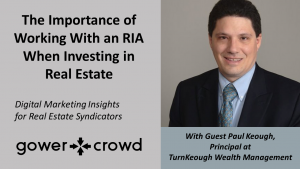Jillian Sidoti, Partner at Crowdfunding Lawyers, LLP
How To Know When Education Becomes Solicitation in CRE Crowdfunding
 Jillian Sidoti, Partner at Crowdfunding Lawyers, LLP
Jillian Sidoti, Partner at Crowdfunding Lawyers, LLP
My amazing guest today, Jillian Sidoti, is one of the preeminent real estate crowdfunding lawyers in the country. She represents some of the most influential crowdfunding industry leaders, including none other than Grant Cardone - to name but a few 🙂 . She was one of the first people to publish a book about crowdfunding and is without doubt one of the highest energy professionals I have had the pleasure of working with.
Today, Jillian answers one of the questions I get most frequently asked: At what point does online activity move from being educational or social to being active solicitation and business? Find out more about Jillian in the links at the bottom of this page.
What You're Going to Learn
- Educate Investors about Investment Opportunities
- How Active Solicitation of Investors Under Regulation D Operates
- The Rules Governing Real Estate Offerings Under the 506(C) Exemption
- The Specific Rules on Soliciting Investors Under Rule 506(b)
- The Rules that Govern Marketing of Real Estate Deals
- When to Use an Investor Qualification Form
- And much more!
Related article: Sage Advice from a Real Estate Crowdfunding Lawyer
Listen To or Watch the Full Podcast Here
Show Highlights
Active Solicitation of Investors Under Regulation D
ADAM GOWER: Let's break this down into like, the real steps right? And the process of this, the investor journey. The beginning of the journey is education. What's an IRR? Why do we use cap rates? Why do, you know, where do we go to? What are the best cities to invest in real estate in, etc, etc. The general information that is ideally unique to the sponsors own value proposition. Right? That's kind of the basic. And so, the way we do that, is we put out articles on social media, on YouTube, etc, and we send emails to prospects. Right? So we're creating this lead generation machine that is asking for names and email addresses and then we're connecting with people via email. Now, in those emails, we are also sending educational content. Here, check out this article on the cap rate, right? Our view of cap rates.
JILLIAN SIDOTI: Right.
ADAM GOWER: OK. So, then a deal shows up and now we want to convert. We want to transition from education to conversion of those prospects. So, in that email, I'd love to get really detailed on this. In that email, can I say, hey, we've got a deal. Minimum investment, $25,000, projected IRR 15%. Invest now. Click here.
JILLIAN SIDOTI: So, it depends. That's the typical lawyer response, right? So it depends.
And what it depends on is, what I like to refer to as, which legal bucket do you fall into? As I like to kind of try to simplify a very complicated law. So, there's more that meets the eye and what I'm about to explain. But as far as I'm concerned, there's four buckets, when we talk about the Federal Securities law and what we want to focus on are the two main buckets, as I like to call them, are two rules under the same regulation. It's called Regulation D, and the two rules are Rule 506(b) and 506(c). And so, if you are doing an offering under 506(c), and that's C as in cats, then, what you're able to do is you're able to raise as much capital as you want from as many accredited investors as you want. And you could do exactly what you said in your e-mail. By the way, I want to clarify, you could do what you said in your email as long as it's the truth. Right? So, and what I'm talking about.
ADAM GOWER: Ah Right. Yeah, yeah, yeah.
JILLIAN SIDOTI: 15% IRR. If you know that's not true, then you shouldn't be saying it anywhere. But, let's just assume that it's true. So 506(c) accredited investors only, general solicitation like that email is allowed. But, what does it mean to be accredited? An accredited investor is somebody who has, who makes at least $200,000 a year as an individual, $300,000 dollars a year as a married couple or has a million dollars in net worth, exclusive of their primary residence and you have to verify that they're accredited.
The Rules Governing Real Estate Offerings Under the 506(C) Exemption
ADAM GOWER: Let's really break this down, so first of all, I've said, can I send this e-mail? There were three things that I picked specifically about that. Minimum investment, a projection of some sort and a button that says invest now. So an active solicitation.
JILLIAN SIDOTI: Right.
ADAM GOWER: So, understanding the accredited investor thing. By the way, the only reason I'm looking to the side, while I talk to you is I'm actually looking at my notes here. Just so you know, I'm not checking email or anything like that. Right so. So now I have a list. Let's say I've got a list of 25,000 people in my database. If I don't know that they are accredited or what their status is, can I send that email? Or can I send it and then tell them you can only invest if you're accredited.
JILLIAN SIDOTI: You can only send that email still. You can only do general solicitation, no matter who it goes out to.
It doesn't matter if it's going out to just accredited investors or a 25,000-person mailing list where you don't really know anybody on. Only in the event that you're doing one of two offerings that 506(c) where it's to accredited investors only or what's called a regulation-A offering which where you're allowed to solicit anybody and mostly take money from anybody so long as you get approved by the Securities Exchange Commission. That's a bigger type of offering. A lot of the bigger real estate developers use that. That's what the fund risers of the world uses, that Regulation-A. But yes, you can still send out that e-mail so long as that offering is pursuant to 506(c) or Regulation-A.
ADAM GOWER: Right, so to clarify. If it's 506(c). This is very technical. We're going to dive very deep, very fast, which is great. But if it's 506(c), that means that I can send that to anybody but, in order for them to invest, they have to become accredited by either. I have to. What is it? Not best efforts, reasonable efforts or use a third party or whatever it is, to actually accredit them. But, it's okay for me to send out 3-pronged e-mail to anybody, irrespective of whether or not I know that they are accredited. Right?
JILLIAN SIDOTI: Correct. Correct.
FOR REAL ESTATE DEVELOPERS
THE WHITE BOARD WORKSHOP
Learn the exact system best of class sponsors use to raise money online.
Specific Rules on Soliciting Investors Under Rule 506(b)
ADAM GOWER: If I'm doing a 506(b), that email is forboden, right?
JILLIAN SIDOTI: You shouldn't. If you're doing a 506(b) and you send that email out at all, you've ruined your exemption. So what's 506(b)? Let's define that real quick. So 506(b) is an offer, in where you can raise as much money as you want, but you can only raise money from people you have a substantive pre-existing relationship with. A substantive pre-existing relationship means that you have intimate knowledge of one's financial ability to invest. And so, this means that people who are sophisticated or accredited. Those are the only two types of people who can take money from. Those are people who have the financial ability to invest, according to Securities Exchange Commission and the laws. A sophisticated investor is somebody who understands the risks associated with investing, but may not be quite Accredited. They might not have the income or the net worth of an accredited investor. And we've already defined an accredited investor. So you have an expansion of the type of investor you can take. But a contraction of who you can reach out to in terms of your solicitation. So that email would be completely illegal to fund a 506(b).
Rules that Govern Marketing of Real Estate Deals
ADAM GOWER: So, if that was the case, could I do this? Can I say, we have a deal. You have to be accredited or sophisticated, by these rules. Right? Click here to find out what that means. If you're not sure, click this link to find out more and on that landing page that they end up at, it says something like, yes, I am accredited. Right? If they go through that firewall, can I then show them these 3-prongs. Minimum? Here's our projections. And please invest now.
JILLIAN SIDOIT: Not necessarily because you've now conditioned the market. They know there's a deal. You've solicited somebody to come in. This is where it gets really dicey, right? Because we want people to come to us. But, it's the minute you start implying that there's any kind of deal to be had, that we kind of get into a difficult situation. And some states don't appreciate what they call conditioning the market. And I've actually received a letter of behalf of one of my clients years ago, for "conditioning the market". And this was what was on their website. We provide our investors opportunities to invest in Midwest real estate without having to leave the comfort of their home. There was no deal spoken about. There was nothing. It was just the implication that they want investors to come into their deal. And they considered and the letter that I got from the state was this isn't a general solicitation. They got that right out of the way. However, you are conditioning the market. You're trying to get people in through some means of general solicitation, even if you're not offering them a specific deal. We know what you're up to. Cut it out.
Other Episodes You Might Like
A guide for remote workers
How to Setup a TV Studio Quality Home Office















